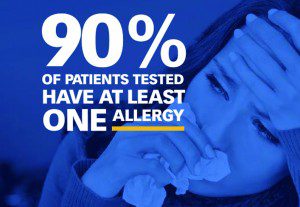 Sixty million Americans have allergies and 24 million have ocular allergies. It is the fifth leading chronic disease in the US and $1.3 billion per year is spent on allergy-related physician visits. “Many patients with ocular allergies may not even be aware that allergies are causing their symptoms,” said Dr. Jonathan Frantz, medical director of Frantz EyeCare. “When they come in to our office, they are simply looking to us as their eye doctor to diagnose and treat their eye condition,” said Frantz.
Sixty million Americans have allergies and 24 million have ocular allergies. It is the fifth leading chronic disease in the US and $1.3 billion per year is spent on allergy-related physician visits. “Many patients with ocular allergies may not even be aware that allergies are causing their symptoms,” said Dr. Jonathan Frantz, medical director of Frantz EyeCare. “When they come in to our office, they are simply looking to us as their eye doctor to diagnose and treat their eye condition,” said Frantz.
With an estimated 25 to 40 percent of its patients having symptoms of ocular surface disease, Dr. Frantz recently implemented a diagnostic test for ocular allergies called Doctor’s Allergy Formula, which lessens the confusion around the patient’s allergies. The test is covered by major medical insurance. Many people suffer for years before being tested or even realizing that ocular allergies are the issue. Allergies interfere with their day-to-day life and can result in loss of productivity, missed work or school, and an overall poor quality of life.
Adding allergy testing to the services provided at Frantz EyeCare just makes sense. The practice already treats other ocular surface diseases such as blepharitis, contact lens over-wear syndrome, and dry eyes. Frantz EyeCare is certified by TearLab as an Accredited Dry Eye Center.
The eyes are particularly sensitive to airborne allergies, which cause irritation and discomfort. Medications, like antihistamines, mask the symptoms but do not identify the underlying problem. “The allergy testing will help us rule out whether a patient’s ‘itchy red eye’ is due to ocular allergies or some other disorder of the ocular surface,” explained Frantz. “If a patient has itchy, dry irritated eyes that are not relieved by initial forms of therapy, allergy testing will be recommended.”
The allergy test is designed to test for 60 of the most prevalent ocular-specific allergens that are specific to our geographic location. The test itself uses non-invasive skin surface testing, which tests for allergic antibodies and consists of introducing small amounts of the suspected substance, or allergen, into the skin and noting the development of a positive reaction. The results are read at 15 to 20 minutes after the application of the allergen. If you are allergic to an allergen, a small mosquito bite-like bump will appear. Because everyone is unique in what their specific allergic triggers are, knowing what you are allergic to is important for the effective treatment of allergies. Once the doctor knows the allergens that are causing your symptoms, an effective treatment plan can be recommended.
“The patient is totally comfortable throughout the testing,” said Frantz.
“It’s non-invasive and gives us so much information.” Some common positive results include allergies to pet dander, cockroaches, dust mites, mold, certain tree spores and fungi. Once the technician performs the test, which is doctor-monitored, the ophthalmologist can then discuss a regimen with the patient. Based on the findings, the doctor discusses possible medical regimens or behavioral and environmental modifications patients can make.
Dr. Frantz said that patients who want to have allergy testing need to stop using their antihistamines or any other allergy medications before testing because they may alter the findings.
For more information on allergy testing or other services provided at Frantz EyeCare, call the main office at 941.505.2020 or visit BetterVision.net.
Jonathan M. Frantz, MD, FACS, is named in The Guide to America’s Top Ophthalmologists. He and his team of doctors at Frantz EyeCare offer a broad spectrum of patient-focused comprehensive care from eye exams and eyewear to bladeless laser cataract removal, treatment of eye diseases, bladeless iLASIK laser vision correction, and eyelid surgery with office locations in Fort Myers, Cape Coral, Punta Gorda, Lehigh Acres, and Naples.







